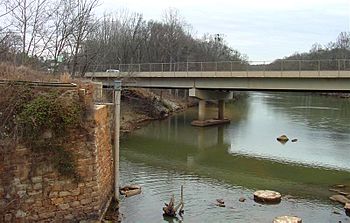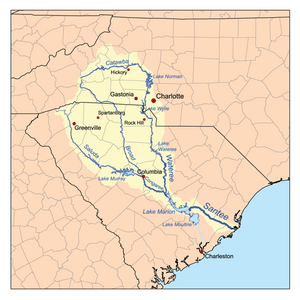Saluda River facts for kids
Quick facts for kids Saluda River |
|
|---|---|

The Saluda River at Pelzer, South Carolina
|
|

Map of the Santee River watershed showing the Saluda River.
|
|
| Country | United States |
| State | South Carolina |
| Physical characteristics | |
| Main source | Greenville County, South Carolina, South Carolina |
| River mouth | Congaree River Columbia, Richland County, South Carolina 118 ft (36 m) |
| Length | 200 mi (320 km) |
| Basin features | |
| Progression | Saluda → Congaree → Santee → Atlantic Ocean |
| River system | Saluda River |
| Tributaries |
|
The Saluda River is a major river in South Carolina, United States. It flows for about 200 miles (320 km). The Saluda River is a tributary (a smaller river that flows into a larger one) of the Congaree River.
Eventually, its waters join the Santee River and flow into the Atlantic Ocean. This whole area is called the watershed of the Santee River.
Contents
Where the Saluda River Flows
The Saluda River starts about 10 miles (15 km) northwest of Greenville. It forms where two smaller rivers meet: the North Saluda River and the South Saluda River. Both of these start in the Blue Ridge Mountains.
North Saluda River
The North Saluda River flows south through northern Greenville County. It passes by the town of Marietta.
South Saluda River
The South Saluda River flows southeast along the border of Greenville and Pickens County. It is joined by the Oolenoy River and the Middle Saluda River. The Middle Saluda River begins in Jones Gap State Park.
Journey to the Congaree
After these rivers meet, the main Saluda River flows southeast. It travels through many counties in the Piedmont region. These counties include Pickens, Greenville, Anderson, Abbeville, Laurens, Greenwood, Newberry, Saluda, Lexington, and Richland.
Along its path, the river passes towns like Piedmont, Pelzer, and Ware Shoals. Finally, it meets the Broad River in Columbia. When these two rivers join, they form the Congaree River.
Dams on the Saluda River
Many dams have been built along the Saluda River. These dams create lakes and help produce power. Some of the important dams include:
- A dam near Greenville and Pickens Counties, which forms Saluda Lake.
- The old textile mill dam in Piedmont.
- A dam at Pelzer.
- A dam at Ware Shoals that still helps power a textile mill.
- Greenwood Dam, which creates Lake Greenwood.
- Dreher Shoals Dam, which creates Lake Murray. Lake Murray is a very large and popular lake.
Rivers Joining the Saluda
Several other rivers flow into the Saluda River or the lakes it forms:
- The Reedy River flows into Lake Greenwood from the north.
- The Little River joins the Saluda from the north in Newberry County.
- The Bush River flows into Lake Murray from the north.
- The Little Saluda River flows into Lake Murray from the south. It starts near the town of Saluda.
River Crossings
The Saluda River is crossed by many roads and bridges as it flows downstream. Some of these crossings include:
- U.S. Route 123 near Easley.
- Interstate 85.
- South Carolina Highway 20 in Pelzer.
- U.S. Route 25 in Ware Shoals.
- South Carolina Highway 72 at Lake Greenwood.
- South Carolina Highway 34 near Ninety-Six.
- South Carolina Highway 6 across Dreher Shoals Dam at Lake Murray.
- Interstate 20 and Interstate 26 in Columbia.
- A footbridge at Riverbanks Zoo.
Different Names for the River
Over time, the Saluda River has been known by a few different names. These include:
- Chickawa
- Corn River
- Saludy River
- Saluta River
- Salutah River
- Seleuda River
The river gets its name from an Indian tribe that used to live along its banks. This was near the community of Chappells.
Protecting the Saluda River
In 2008, a group of people from Marietta started a campaign called "Save Our Saluda." They wanted to protect the river from too much building and development. Their goal is to keep the river's starting points and watershed safe.
River Under Threat
In 2009, a group called American Rivers listed the Saluda River as one of the rivers in the United States that was in danger. They said that too much sewage waste was getting into the river. This waste can harm the drinking water for over 500,000 people in South Carolina.
Sewage in the river causes problems like high levels of phosphorus and algae. This uses up oxygen in the water, which can kill fish and other water animals. American Rivers asked the South Carolina Department of Health to improve how sewage is treated. They also asked for the river's phosphorus levels to be reduced by 25 to 50 percent.
See also
 In Spanish: Río Saluda para niños
In Spanish: Río Saluda para niños
 | Laphonza Butler |
 | Daisy Bates |
 | Elizabeth Piper Ensley |

